With just under five weeks to go until the 2023 Rugby World Cup kicks off in Paris, we're looking back at the history of the tournament, from its origins in New Zealand and Australia 36 years ago, to its tenth instalment in France this September.
This week, we've moved on to the 2003 edition in Australia, where England broke the southern hemisphere stranglehold to bring the Webb Ellis trophy north, as Jonny Wilkinson's dropgoal late in extra time saw them become the first and only world champions from the Six Nations.
The Hosts
Having co-hosted the tournament alongside New Zealand in 1987, Australia were meant to do similar in 2003 before being awarded the status of sole-hosts after a contractual dispute between the New Zealand union and tournament organisers.
Stadium Australia in Sydney was the flagship venue for the tournament, with the 2000 Olympic stadium having been redeveloped in the years following the summer games, with the 83,500 seater venue used for both semi-finals as well as the third-place playoff and final.
Eleven grounds in total were used, with Ireland playing their games at Central Coast Stadium in Gosford, Aussie Stadium in Sydney, the Docklands Stadium in Melbourne and the Adelaide Oval.
Suncorp Stadium in Brisbane hosted two quarter-finals, with Townsville, Perth, Canberra, Wollongong and Launceton also featuring in the pool stages
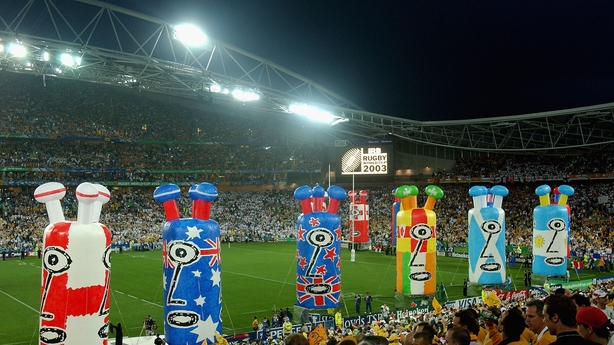
The story of the Rugby World Cup: Aussies party like it's 1999 as All Blacks stunned by Les Bleus
Pools
Pool A: Australia, Ireland, Argentina, Namibia, Romania
Pool B: France, USA, Japan, Fiji, Scotland
Pool C: South Africa, England, Samoa, Georgia, Uruguay
Pool D: New Zealand, Wales, Italy, Canada, Tonga
The story of the Rugby World Cup: Springboks unite a nation in 1995
Ireland
Following the disaster of Lens in 1999, Ireland found themselves having to go through a qualifying campaign to reach the 2003 tournament in Australia.
It was more of a nuisance than a real challenge, with a 35-3 win against Russia in Siberia, and a hammering of Georgia in Dublin in September 2002 seeing them seal their place with relative ease.
That defeat to Argentina in 1999 would stay with the team right up until the tournament, with Eddie O’Sullivan’s side set to face the Pumas in the third game of the pool stage. And with hosts Australia also in the pool along with minnows Romania and Namibia, it looked like that meeting with Argentina would be an unofficial knockout game.
The four years post-Lens had been good to Irish rugby. After Ulster’s 1999 Heineken Cup win, Munster had reached the final in both 2000 and 2002, while Leinster were semi-finalists in 2003.
The Ireland team had also turned a corner. Keith Wood returned for his last dance at the 2003 tournament following a year of both injury and personal grief, and Brian O’Driscoll had established himself as one of the game’s great talents.
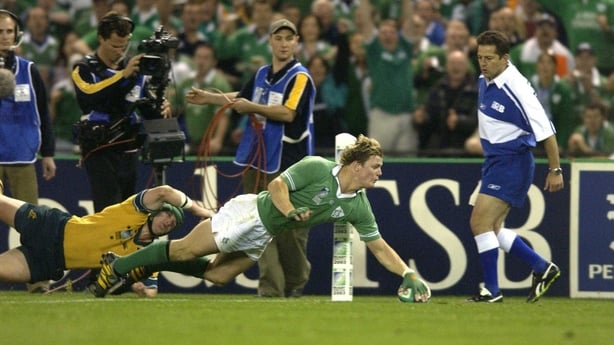
Eddie O’Sullivan replaced Warren Gatland as head coach in late 2001, and was overseeing a side with quality young prospects like Paul O’Connell, Peter Stringer and Ronan O’Gara, who by now was neck-and-neck with David Humphreys for the starting out-half shirt.
Despite losing 42-6 to England in the final round of the Six Nations, it had been the first time in 21 years that Ireland had reached the final round of games with a shot at the Grand Slam. Their win against France that spring had been their third in four years, while they'd also claimed a famous win against the world champions Australia the previous November.
O’Sullivan’s side were in a good place heading into the tournament, although preparations were hit in their warm-up game against Scotland when Geordan Murphy suffered a broken leg. The Leicester Tigers full-back had been in tremendous form leading up to the summer, and was primed to be a key player at the World Cup.
Their tournament started as expected with easy wins over Romania and Namibia, but the third game against Argentina was the one everybody had their eyes on.
The Pumas had been beaten by Australia in their opening game, and as such Ireland knew the stakes. Win against Argentina and they would be through to the quarter-final with a free shot against the hosts a week later. Lose, and they would have to beat the Wallabies to stand any chance of reaching the quarters.
With so much on the line for what had become bitter rivals, a tense, ugly game naturally followed, with Keith Wood and Reggie Corrigan both claiming to have been eye-gouged in the second half.
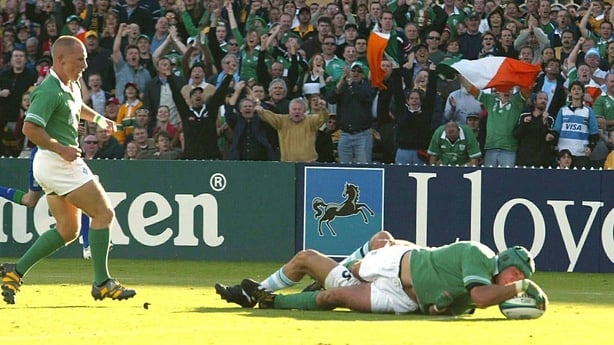
In windy conditions, Argentina’s lineout was a disaster throughout, and it was off the back of one of those turnovers that Wood played in Alan Quinlan, who outpaced Ignacio Corleto to score the decisive try, and dislocate his shoulder in the process.
It went back and forth; Ireland were 10-9 in front at the break, before the Pumas nudged ahead 12-10. O’Gara came off the bench to kick two penalties to give Ireland a 16-12 lead, with Gonzalo Quesada making it a one-point game on 73 minutes. In the end Ireland survived.
The win against Argentina seemed to release the valve on the pressure cooker. Against Australia a week later, Ireland almost pulled off a huge shock in Melbourne. Trailing 14-6 at one stage, O’Driscoll hauled them back into the game with one of the great Irish World Cup tries, which O’Gara converted from the touchline to make it 14-13. With five minutes left, Australia were clinging onto a 17-16 lead, and David Humphreys was a whisker away from putting Ireland in front with a dropgoal attempt.
The world champion Wallabies held on, and after finishing top of the pool they would easily see off Scotland in the quarter-finals, before defeating the All Blacks to get back to the final.
Ireland ran out of steam against France in the last eight, losing 43-21 against a Les Bleus side that were inspired for the opening 40 minutes.
Once again, they were left to wonder what might have been, however this time it looked like the future was still bright.
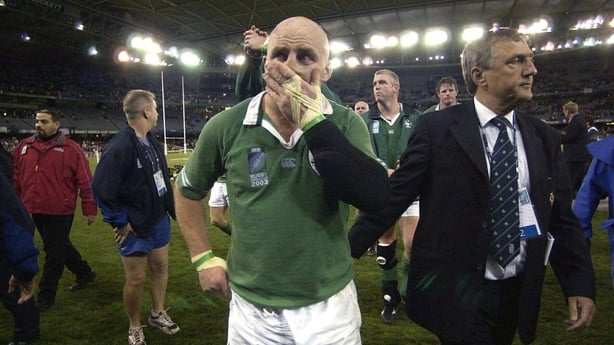
Ireland squad: Shane Byrne, Frankie Sheahan, Keith Wood (capt), Simon Best, Reggie Corrigan, John Hayes, Marcus Horan, Gary Longwell, Donncha O’Callaghan, Paul O’Connell, Malcolm O’Kelly, Simon Easterby, Keith Gleeson, Alan Quinlan, David Wallace, Victor Costello, Anthony Foley, Eric Miller, Neil Doak, Guy Easterby, Peter Stringer, David Humphreys, Ronan O’Gara, Paddy Wallace, Kevin Maggs, Brian O’Driscoll, Anthony Horgan, Shane Horgan, John Kelly, Tyrone Howe, Girvan Dempsey
Results
Pool A: Ireland 45-19 Romania (11 October – Central Coast Stadium, Gosford)
Pool A: Ireland 64-7 Namibia (19 October – Aussie Stadium, Sydney)
Pool A: Argentina 15-16 Ireland (26 October – Adelaide Oval, Adelaide)
Pool A: Australia 17-16 Ireland (1 November – Docklands Stadium, Melbourne)
QF: France 43-21 Ireland (Docklands Stadium, Melbourne)
Eight years into professionalism, the first few weeks of the 2003 RWC were an eye-opener into the gulf that had formed between those at the top and bottom of world rugby.
Twenty years on at France 2023 next month we’ll still see pool stage hammerings, but it’s unlikely to be to the same extent that we had in Australia, where the hosts’ 142-0 win against Namibia remains a tournament record.
Having tweaked with formats and increased the number of teams down the years, the 2003 Rugby World Cup in Australia was the biggest yet with a total of 48 games (an increase of seven), and they finally settled on a format that’s still being used to this day.
Just as there was in 1999, 20 teams took part in the finals, but the convoluted system used in that tournament was scrapped in favour of a more simplified version; instead of five pools of four, we flipped around to four pools of five. The other tweak in the format was the introduction of the bonus-point system which is now widely used across the game. The one-sided nature of many of the pool games meant that its impact was minimal though.
Having come into the tournament as defending world champions there was pressure for Australia to deliver. Since winning a nail-biting Test series with the British and Irish Lions in 2001, head coach Rod Macqueen had retired and was replaced Eddie Jones, who set about strengthening an already world class squad.
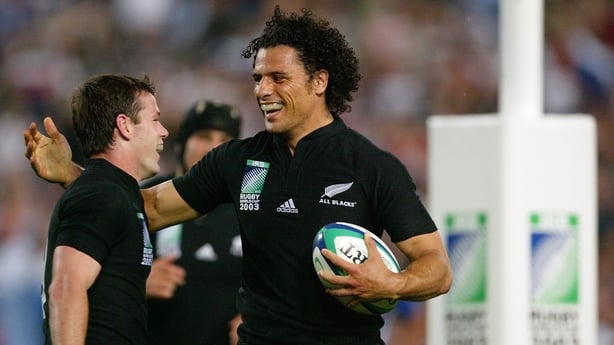
By the time the 2003 World Cup rolled around, the Australian Rugby Union had splashed out on bringing three superstars of rugby league over to union; Wendell Sailor, Mat Rogers and Lote Tuqiri all crossed codes between 2002 and 2003.
They weren’t the only country tapping into League talent; England’s Jason Robinson was now well-established as one of the elite back-three players in the game, while Clive Woodward’s assistant Phil Larder was one of the early defence specialists who had roots in rugby league.
Larder played a key role with that great English side who would go on to become the first and only rugby world champions from the northern hemisphere, but it was QC Richard Smith who arguably played the most important role in England’s World Cup triumph.
For roughly 30 seconds of England’s Pool C win against Samoa, the Six Nations champions had 16 players on the field; the mix-up arising while Mike Tindall was down receiving treatment and Dan Luger was sent on as a replacement without checking with the officials. Tindall subsequently got back to his feet and rejoined the game, before referee Jonathan Kaplan realised the error and sent Luger back off.
The reaction ranged from indifferent in some quarters, to apoplectic in the Australian media. A points deduction, or even expulsion from the tournament seemed to be on the table for England.
Woodward, however, had every eventuality covered for the tournament, having insisted on having a legal expert in camp.
"You talk about pressure and making the wrong calls, that [substitution] was the wrong call by me, which I regret," the England coach said in a documentary.
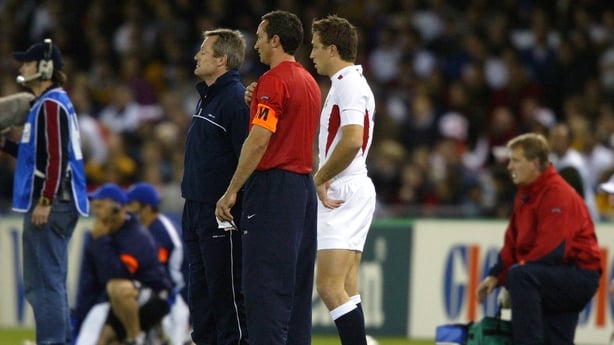
"What was the right call was having a QC down there, because when we went to Sydney, this was a serious situation. I’ve never been so nervous in my life, because it was like a courtroom."
In the end, they were relieved to escape with a £10,000 fine.
England went through the motions in the pool stage. As expected, they thrashed Georgia and Uruguay, with contrasting performances against South Africa and Samoa. They dominated the Springboks in Perth before labouring to a 35-22 win against the Samoans, sealing top spot in their pool.
By topping their pool they avoided the pre-tournament favourites New Zealand, who picked up four bonus-point wins from four in the group. John Mitchell’s side would go on to make light work of South Africa in the quarters, solidifying their favourites tag with a 29-9 win against the Boks.
The semi-final pairings of Australia v New Zealand and England v France ensured we would have our fourth North v South final from five World Cups.
Despite Australia being hosts, the All Blacks looked like a clear favourite having won twice against the Wallabies in the Tri-Nations a few months previous, with one of those victories being a Joe Rokocoko-inspired 50-21 hammering in Sydney.
Stirling Mortlock’s intercept of Carlos Spencer (below) on nine minutes gave Australia the perfect start, and the boot of Elton Flatley saw them nudge out to a 13-0 lead in the opening half.
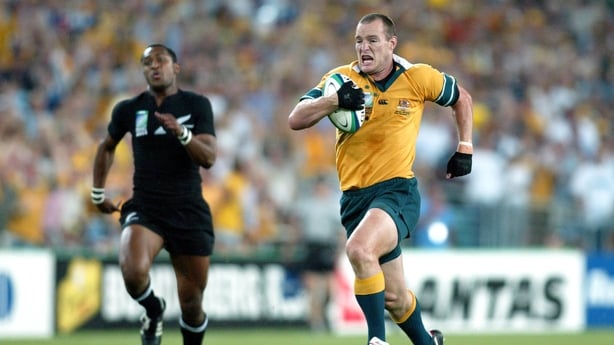
Reuben Thorne’s try saw the All Blacks rally before the break, but Flatley kept the scoreboard ticking over in the second half as the Wallabies saw out a 22-10 victory to book their place in the final where they would face England, whose out-half Jonny Wilkinson scored all 24 points in their 24-7 win against France.
In the final at the 82,957 Stadium Australia, it was the hosts who again made the perfect start with a try inside six minutes, as they looked to take advantage of Lote Tuqiri’s height advantage over Jason Robinson, launching a high ball to his corner which the Fiji-born wing took advantage of to score.
As he did in the semi-final, Wilkinson kept things ticking over with the boot to put England ahead, before Robinson’s try just before half time sent Woodward’s side 14-5 in front. As the second half wore on, so did the nerves, with Australia creeping back into the game through Flatley penalties, before the Wallabies’ centre sent the game into extra time at 14-14.
Again, Wilkinson and Flatley traded penalties in extra-time as the possibility of a kicking competition loomed, but with a minute left Matt Dawson’s sniping break took England into the Australia 22, and bringing Wilkinson into perfect dropgoal territory. Two phases later Dawson was back in his feet to deliver the pass back to the out-half, and on his weaker right foot, he split the posts to kick England to World Cup glory.
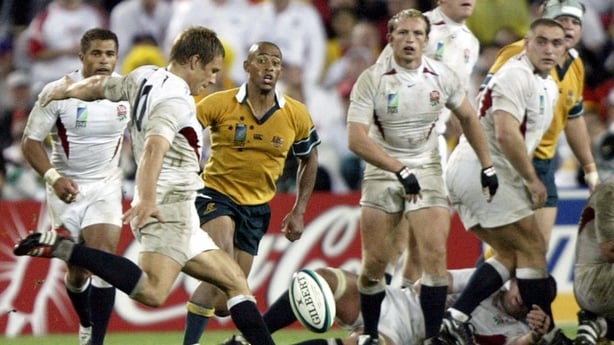
Top points scorers:
Jonny Wilkinson (England): 113 points
Frederic Michalak (France): 101 points
Elton Flatley (Australia): 100 points
Top try scorers:
Doug Howlett, Mils Muliaina (New Zealand): 7 tries
Joe Rokocoko (New Zealand): 6 tries
Will Greenwood, Josh Lewsey (both England), Chris Latham, Mat Rogers, Lote Tuqiri (all Australia): 5 tries
Listen to the RTÉ Rugby podcast on Apple Podcasts, Soundcloud, Spotify or wherever you get your podcasts.
Watch live coverage of Ireland v Italy this Saturday from 7.30pm on RTÉ2 and RTÉ Player, listen to live commentary on RTÉ Radio 1 Extra or follow a live blog on RTÉ.ie and the RTÉ News app.


